Meet the Manipuri Legend Going Where No Indian Woman Footballer Has Gone
"To play my football in Europe with one of the biggest clubs in the world is something I could never have dreamed of."
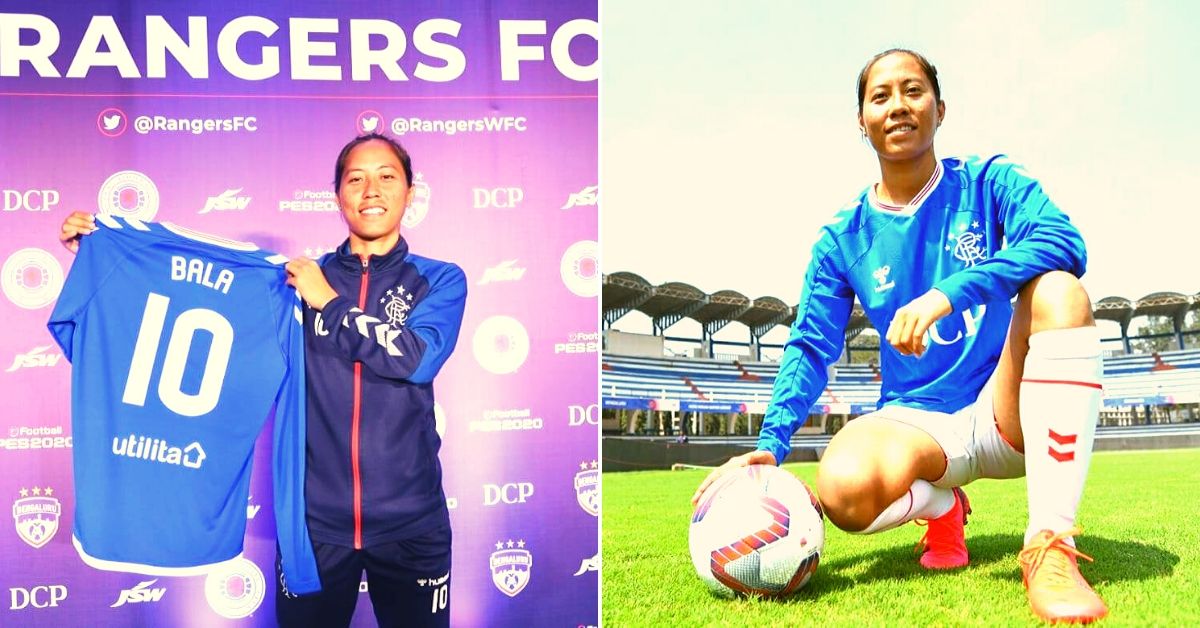
Growing up during the late 1990s, in Irengbam, a small village situated in Manipur’s Bishnupur district, Ngangom Bala Devi was a regular presence on the local football field. Encouraged by her father, a former player, and her elder brother, this talented girl would go toe to toe against the local boys and beat them. Yes, there was the odd disparaging comment, but it only added further fuel to the fire within this prodigiously gifted athlete.
“My father, an ex-player, and my brother encouraged me to play football from a young age. I must have first kicked a football when I was 4 or 5 years old. But it was in 2002 when I fell in love with the game after watching Brazilian stars Ronaldo and Ronaldinho in the World Cup,” said Bala, during a conversation with The Better India (TBI) in late February.
More than two decades later and barely a week before her 30th birthday on 29 January 2020, Glasgow-based Scottish giants Rangers Football Club (FC) announced that they had signed her on an 18-month contract.
Bala Devi had made history. With the move official, she had become the first Indian woman to become a professional footballer and sign a contract with a European club.
“To play my football in Europe with one of the biggest clubs in the world is something I could never have dreamed of. I hope my move to Rangers serves as an example to all the women footballers back home in India who dream of taking up the sport professionally,” said Bala Devi, in a conversation with the in-house club website.
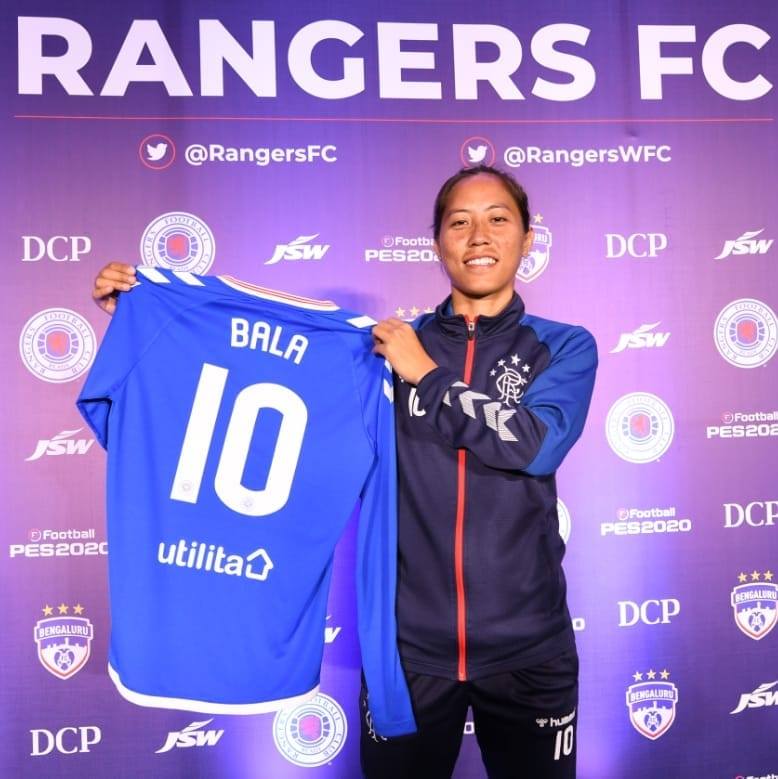
Early Years
Bala Devi was barely 11 years old, when she joined a local girl’s football club, ICSA, and began competing in district-level matches. But the centre forward’s ability stood way above her peers. Bala was barely 12 when she was first considered to play for the Under-19 women’s national team. However, she was deemed too young and was asked to come back after turning 14. At age 15, she played for the Under-15, Under-19 and the senior women’s national team as well.
The trajectory of Bala’s early career mirrored that of her idol Oinam Bembem Devi, the Padma Shri-award winning midfielder from Manipur, who also made her debut for the senior team at 15. Bembem would go on to carry Indian women’s football on her sturdy shoulders for over two decades before playing her last national team match in 2016.
Following a short stint in an Imphal club, Bala Devi joined the Manipur Police Sports Club, a team that also produced Bembem Devi. She played for them semi-professionally and worked as a policewoman for the Manipur Police Department until her move to Rangers FC.
The presence of phenomenal players like Bembem and Bala ensured that Manipur’s women team ended up winning 20 of the 25 national championships held since 1991.
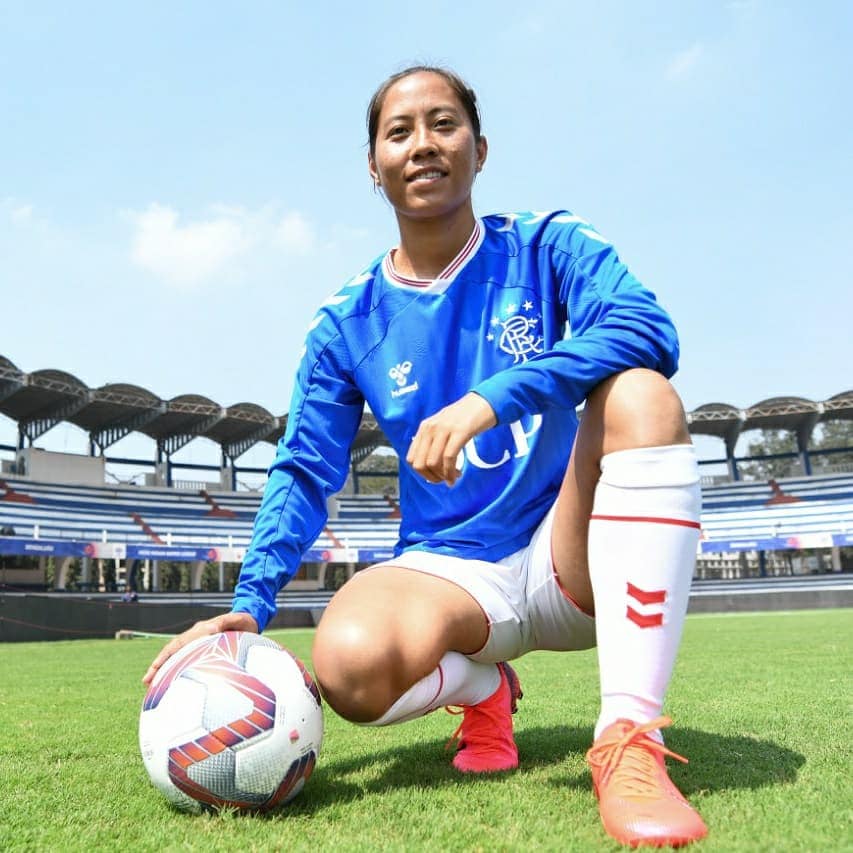
Phenomenal Record
Playing for the national team, Bala has scored a sensational 52 goals in 58 appearances since 2010, which also makes her the top international goalscorer in South Asia.
Top-scoring in the Hero Indian Women’s League for the past two seasons, she has also earned the All India Football Federation (AIFF) Women’s Player of the Year award twice in 2015 and 2016. She has also served as her national team captain in a distinguished international career. During her stint with the national side, she has won the SAFF Women’s Championship (also known as South Asian Football Federation Women’s Cup) three times (2010, 2014 and 2016) and three gold medals (2010, 2016 and 2019) in the South Asian Games as well.
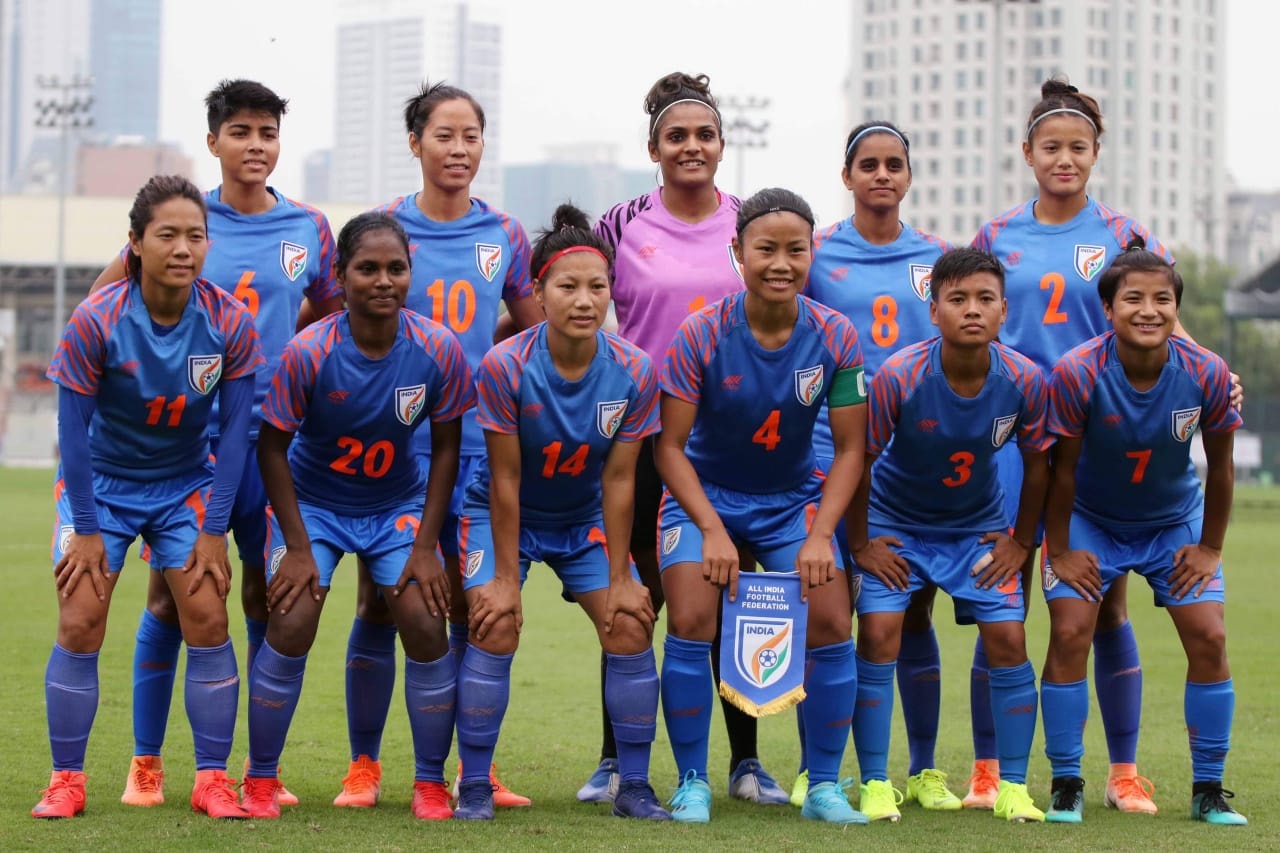
Style of Play, Pure Talent & India’s best Woman Footballer
Addressing the press on the day Bala was signed, Amy McDonald, the Rangers Women’s and Girls’ Football Manager, described her game as a “playmaker who likes to play as a number 10” who they believe will contribute goals and assists to the team.” She duly delivered in her debut match versus Hearts on 23 February, with first assist for the club playing a deft one-two pass with 18-year-old striker Megan Bell.
“Coming from a humble background in rural Manipur, Bala has an incredible work ethic. She has been playing for the national team since she was 15, and is known for her speed, athleticism, game intelligence and skill. She made her mark playing the centre forward position banging in the goals. However, in the past few years, her vision and game intelligence has also developed significantly and as a result she has withdrawn to a more attacking or central midfielder role. From these positions, she can control the game better and bring more of her teammates into play. At Rangers, she is playing both a centre forward and attacking midfield roles,” says Anuj Kichlu, her representative, speaking to TBI.
Like Kichlu, who has known about her talent since 2007/08, former Indian men’s team player and mentor Renedy Singh is all praises for his fellow Manipuri’s ability.
“For years, I had heard about Bala Devi’s talent on the field. Although our women’s game has been neglected for many years, she always stood out for the number of goals scored during competitions like the SAFF Women’s Championships. Although those in the national setup knew of her talent, other casual viewers knew nothing because of how little they cared for the women’s game. But I saw Bala Devi play for the first time in the flesh during an exhibition game at the DY Patil Stadium in Navi Mumbai, which was held in the run up to the 2017 FIFA Under-17 World Cup in India,” he recalls.
Legends of the international game including Carlos Valderrama, Fernando Morientes, Marcel Desailly, Jorge Campos and Emmanuel Amuneke took on a mixed gendered Indian contingent which included Singh, Steven Dias, Bembem Devi and Bala Devi in the five-a-side game. The Indian contingent won the match 5-4.
“Bala came on for a couple of minutes, scored two goals and that’s when I truly understood her level of talent. Her skill and ability really stood out,” adds Singh.
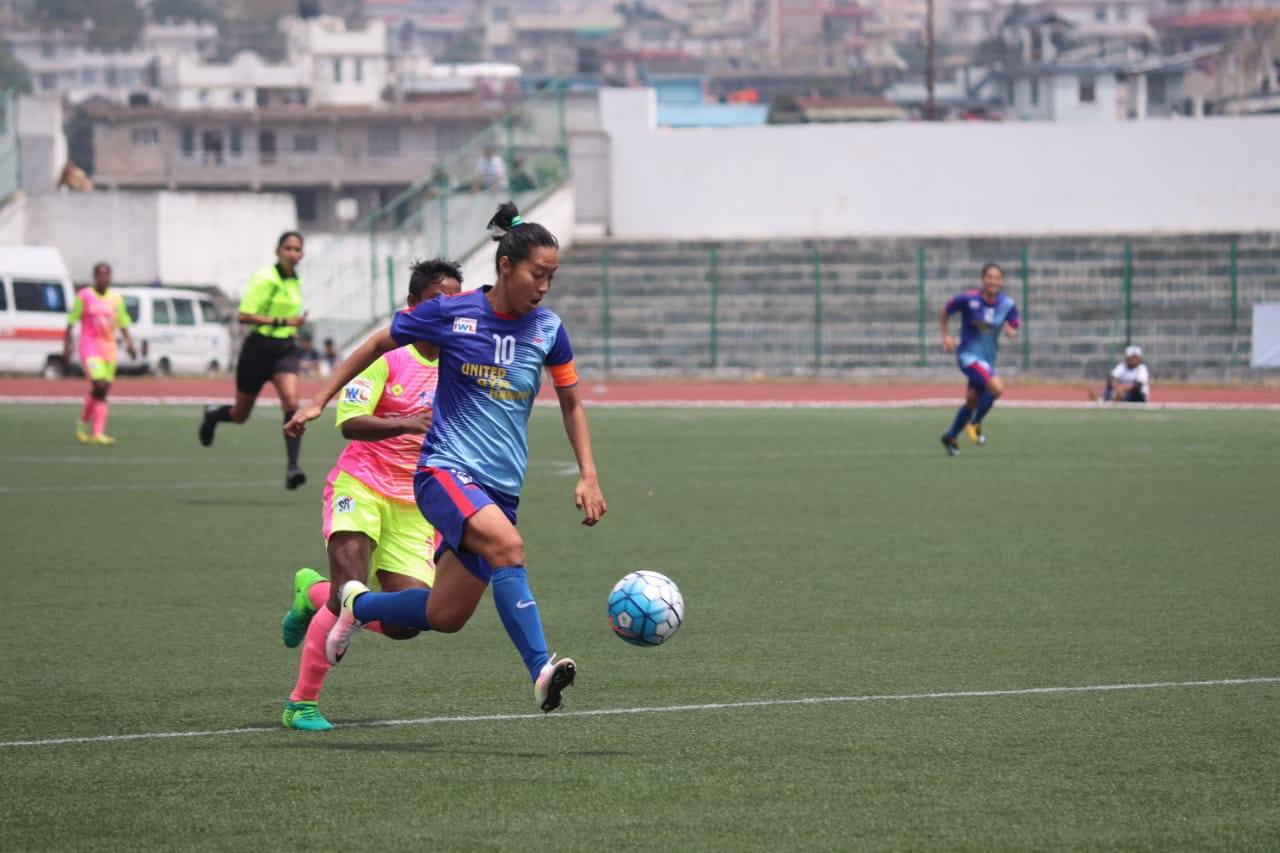
Move to Rangers
Anuj Kichlu, a sports agent working out of Mumbai, Kolkata and Madrid, was in Manipur at the time and looking for Bala.
“Anuj had always wanted to do something for women’s football in India. He felt that with greater exposure abroad talented women players in India could really develop their game and what better way to start than Bala. I introduced Bala to Anuj, following which the two of them had a conversation,” says Renedy.
“During our discussions, we decided that to explore options for Bala to play professional football abroad full-time and pave the way for other Indian players as well,” says Anuj, recalling his meeting with her.
From that moment forward, Bala expressed her desire to play in a top European club, and the best way to approach that was to obtain a trial. Unlike the ISL for the men’s game, there was very little attention for women’s football.
There are two aspects of how the deal with Rangers FC came to fruition. It first began with the Indian women’s team participation in the COTIF Cup 2019 in Valencia (Spain) in July where they played four games. Winning against Bolivia (7-0) and Mauritania (3-1) and losing two against Spanish club Villarreal (0-2) and Spain Under-19 (0-2).
Playing in these matches, Bala impressed and was selected in the team of the tournament. After the tournament, club sides from Sweden, Spain and Norway had approached her but none of them came up with a concrete offer. Nonetheless, she was on their radar.
The second aspect of this transfer involves Bengaluru FC, which forged a partnership with Rangers FC in September last year. While senior Bengaluru FC officials were in Scotland for the announcement of a tie up, they had some discussions with Rangers’ Women’s and Girls’ Football Manager Amy McDonald. Since the club does not have a women’s team, they thought about sending someone from the Indian women’s national team for a trial.
Upon their return to India, Bengaluru FC officials felt Bala Devi was the best possible candidate. Also, Rangers were looking to further develop their women’s team, seeking talent from around the world. Ranked 55 in the world, they thought India has a decent national women’s team, and maybe getting their top player onboard could be a real possibility.
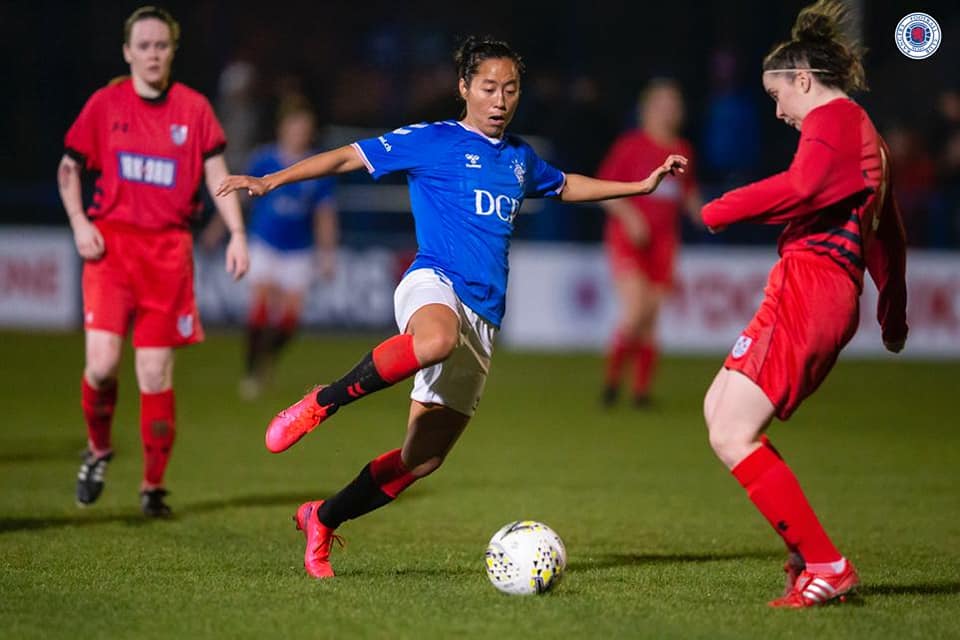
“Rangers agreed to take a look at Bala Devi, watching her game up close. She did really well in her trials there in November, and the club offered her a 18-month contract,” says Anuj.
During her trial, she scored twice in one of the games they played among fellow Rangers players.
However, there was another element to the transfer. Due to the Indian women’s football team’s FIFA ranking outside the top-40, she did not automatically fulfill the eligibility criteria to play in the United Kingdom. The eligibility rules state that the player’s country must rank within the top-40 and that she has had to play 75 per cent or more of the national team’s games in the past two years. She didn’t fulfill the first criteria.
Fortunately, a six-member panel to the Scottish Football Association (SFA) granted Bala the UK work permit on a special exemption after the Rangers FC team presented their case and members of the Indian football fraternity including AIFF president Praful Patel, Indian women’s team coach Maymol Rocky, Bembem Devi, Bhaichung Bhutia, Renedy Singh, and the current national team captain Sunil Chhetri, all wrote recommendation letters.
After all the paperwork was sorted out, the transfer was finalised on 29 January.
What does her transfer to Rangers FC mean?
“Bala’s move to a big European club is such an inspiration to women not only in Manipur and Northeast, but all over India. I want her to play week-in and week-out and do well so that players here can get inspired. She is a pioneer for the women’s game in India,” says Singh.
More importantly, however, playing full-time professionally at a serious European club will give her the opportunity to play around the year. The current league runs from February to November with matches scheduled regularly in addition to Cup competitions unlike India where the Indian Women’s League runs for just three weeks.
“Unlike the men’s game, which has regular club matches through the I-League and ISL during the course of a year, the women’s league in India barely extends to a month. Many state associations run grassroots programs, but it’s only for a month. What are the players expected to do for the next 10-11 months? Where is their development happening? If you don’t have the money for eight months, do it for four or five at least,” says Singh.
Moreover, unlike the men playing ISL, who are exposed to the professional game and regularly train with quality international players, the women enjoy no such advantages.
“No Indian woman has ever played professionally. For women’s football in India, the set up has been semi-professional with the girls playing also having full time jobs with the government. No woman earns their living playing football full time. Not only does this move help her financially, but it also gives other women in the country an opportunity to compare their standards against European players. The feedback I received is that Indian players are not necessarily weaker, but that they lack regular training and exposure,” he adds.
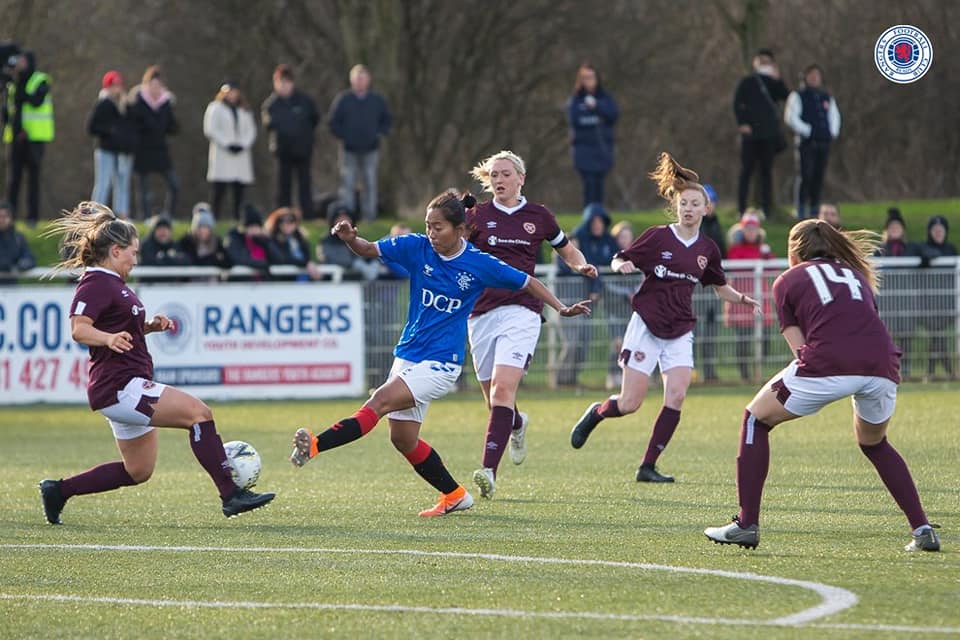
Moreover, Indian women have not been able to play regularly throughout the year. It’s one thing to get exposure playing for your national team, but another proposition altogether playing 30-odd matches across a ten-month season. “Based on where she stands with other players there, other women players in India can gauge their quality levels as well. She will be the benchmark for Indian women’s football for the next decade,” says Singh.
“Hopefully this move will open up opportunities for other players from India to come here and play. Of course, it depends how I play this season and do during my stint in Europe. I hope many can follow me in the future. We have the skills but do not have the exposure,” says Bala.
Unfortunately for Bala, the COVID-19 pandemic-induced lockdown has, for the time being, put brakes on a promising season. But Anuj doesn’t believe the lockdown will have a significant bearing on her contract or career with the Rangers.
“Unlike the packed men’s schedule that was scheduled to finish by the end of May, the women’s league ends in November. So, there is still time to complete the season and adjust the fixtures,” he says. Meanwhile, in terms of her living situation, it has been an adjustment, particularly the language and understanding the Scottish accent. For the most part, however, she seems to have adjusted well to life in Scotland.
If Bala Devi succeeds in her stint with Rangers FC, it could be a massive turning point for the women’s game in India. Her success there could give the women’s game the necessary attention it deserves.
Also Read: This Gritty Girl From Rural Bihar Is Asia’s Fastest Woman Rugby Player
(Edited by Saiqua Sultan)
Like this story? Or have something to share? Write to us: [email protected], or connect with us on Facebook and Twitter.
If you found our stories insightful, informative, or even just enjoyable, we invite you to consider making a voluntary payment to support the work we do at The Better India. Your contribution helps us continue producing quality content that educates, inspires, and drives positive change.
Choose one of the payment options below for your contribution-
By paying for the stories you value, you directly contribute to sustaining our efforts focused on making a difference in the world. Together, let’s ensure that impactful stories continue to be told and shared, enriching lives and communities alike.
Thank you for your support. Here are some frequently asked questions you might find helpful to know why you are contributing?


This story made me
-
97
-
121
-
89
-
167













